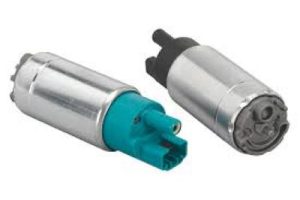Since they run all the time and depend on fuel for cooling, fuel pumps heat up more than anything else. In most cars today, the standard in-tank fuel injection pump delivers fuel to the engine at 40-60 psi. The heat in the pump motor comes from the heavy load pressure demand, especially when under high pressure condition, or under acceleration. Typically the pump is cooled by fuel on all sides but if fuel levels are chronically kept to less than 1/4 tank then the pump loses its primary cooling source and could soon fail due to overheating. If the pump is regularly subjected to low-fuel conditions, this condition can cut the pump's lifespan from its usual 100,000 miles down to 60,000 miles.
Additionally, pump overheating may be due to clogged filters. Fuel filters clogged by debris and sediment in the fuel tank can put increased strain on the pump to keep fuel moving. This greater force raises the internal temperature levels and creates the pump to reach overheat status and also stop working in time. The less of the contaminants that can build up will mean the less a pump has to strain itself. This is why you should ideally change your filters every 30,000 miles as previously described.

Low voltage or bad wiring are some of the reasons for these electric overheating problems as well. All fuel pumps need constant 12-volt power to work optimally. Corrosion in wiring or loose connections can reduce the voltage the pump receives, causing it operate erratically and generate unnecessary heat. This will drastically wear the pump over time, making it 10–15% less efficient because of the amount of stress added.
Automotive guru Carroll Shelby once said, "What you put in your tank will affect how it runs - just like your blood makes you strong; the cleaner your machine, the longer life to run." By using a solid Fuel Pump will keep the pump cooled correctly, it can sometimes get overheated if you have little gas. Making sure to address things like running low on fuel, bad gas or gas with a lot of water in it that clog filters, and electrical problems will help ensure your pump has the longest life possible and maintains consistent delivery while preventing the side effects of an overheating fuel pump.